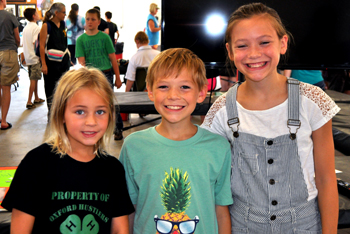October Starts the 4-H New Year

October is the start of the new 4-H year. What does that mean? New families are encouraged to enroll their youth and family into 4-H clubs and become part of an organization which grows great kids!
So, where should a family begin when deciding to participate in the 4-H program? Below are some questions which address a broad range of 4-H facts and information.
Why 4-H?
Raising great kids is a challenge, but it’s easier when you have a team of people behind you. 4-H clubs are groups of families that do just that. Through working together, families share knowledge and interests to help kids learn practical skills and important values.
What is 4-H?
- 4-H is a volunteer-led, informal educational program for youth ages 7-18 years old.
- 4-H is for everyone.
- 4-H is for all youth — urban, suburban and rural.
- 4-H is youth having fun and learning with their friends as well as families.
What do 4-H clubs do?
4-H clubs meet once a month and members consist of boys and girls ages 7-18. 4-H’ers run the meetings, using parliamentary procedure with some help from the adult club leaders. The youth president leads the meeting, but the whole club is involved in all decision-making. During the meetings youth discuss a number of items including community service projects, fundraising and club activities. 4-H’ers have a chance to work on their public speaking by giving presentations to the club.
What happens at a 4-H club meeting?
4-H club meetings are typically held once a month. Members are given the opportunity to learn and practice decision-making in group situations. 4-H members are expected to attend their club's meetings, and parents/guardians are encouraged to attend, as well ... 4-H is a family affair! Members plan and carry out what they want to do as a group.
A club meeting has four parts with definite activities in each part.
- Opening: Call to order, Pledge of Allegiance and 4-H Pledge
- Business: Roll call, secretary's report, treasurer’s report, committee reports, old business and new business
- Education: Program, demonstrations, talks and guest speakers
- Fun: Recreation, songs, skits, refreshments and entertainment
What do you do in 4-H?
In 4-H, youth “learn by doing.” Youth learn useful skills, how to get along with people and how to help our community and country. Some of the ways 4-H’ers achieve this are:
- Project Work - members choose from over 30 different projects which spark their interests
- Demonstrations - members learn to speak in front of others and present on their project work
- Recreation - members play games and make new friends during club meetings
- Community Service - members help improve their community through engaging in service projects
- County Contests - members may choose to enter contests and compete throughout the year
- Exhibits - members exhibit their best project work at the county fair
- Camps - members may participate in a day camp or overnight camp
Who helps in 4-H?
4-H is a family program. Parents and family are important in 4-H. They help the youth with project work and other activities. 4-H members are also helped by volunteer leaders. Every 4-H club needs one or more adult leaders. The leaders teach youth, organize the club, help officers and assist at meetings and orient new parents about 4-H.
There are various kinds of leaders in the 4-H Club:
- Community Club Leaders are responsible for the general organization of the club
- Project Leaders help members with project work, usually outside of club meetings
- Junior Leader 4-H teens work with an adult leader to give leadership to activities, events and projects
Family Involvement
Parents/Guardians are important in 4-H. They show interest and concern for their children by attending meetings, serving as leaders, helping in club activities and serving on committees.
Volunteers
The safety of our children is our #1 priority! All volunteers that work directly with our youth are required to go through a volunteer screening process to become a registered volunteer.
Volunteers must
- apply,
- do a face to face interview,
- complete orientation, and
- pass background checks.
This insures the safety of our 4-H’ers and adult volunteers.
How to begin?
The first step will be to choose a club to visit with your family. It is best to visit two or three clubs as each one is different. This will help you determine the best fit for your child. Our website has a list of where all the clubs are located along with the Club Leader’s contact information. It is best practice to email the Club Leader first to connect with them to let them know your family is interested in 4-H and would like to visit the club.
If you and your family are interested in learning more about 4-H click here for information on details on how to begin your family’s 4-H experience.
Follow us:
- Twitter: @jocoks4h
- Facebook: https://www.facebook.com/JohnsonCountyKS4H
Contact us
At Johnson County Extension, we're here for you. If you have questions call us at 913-715-7000.